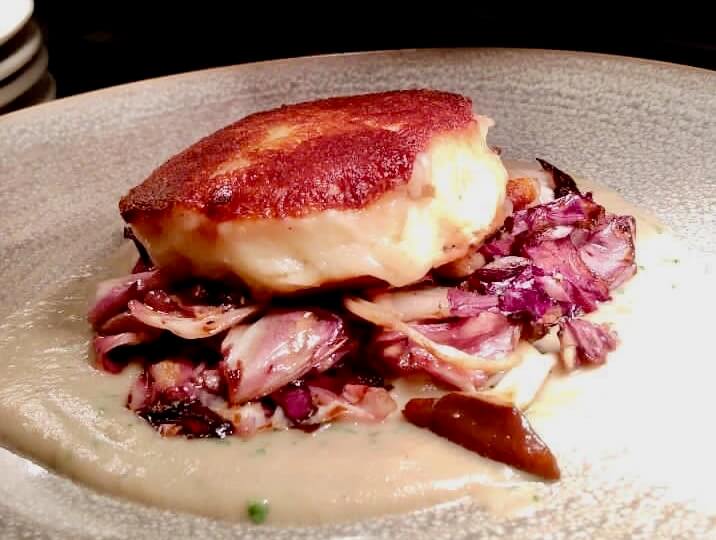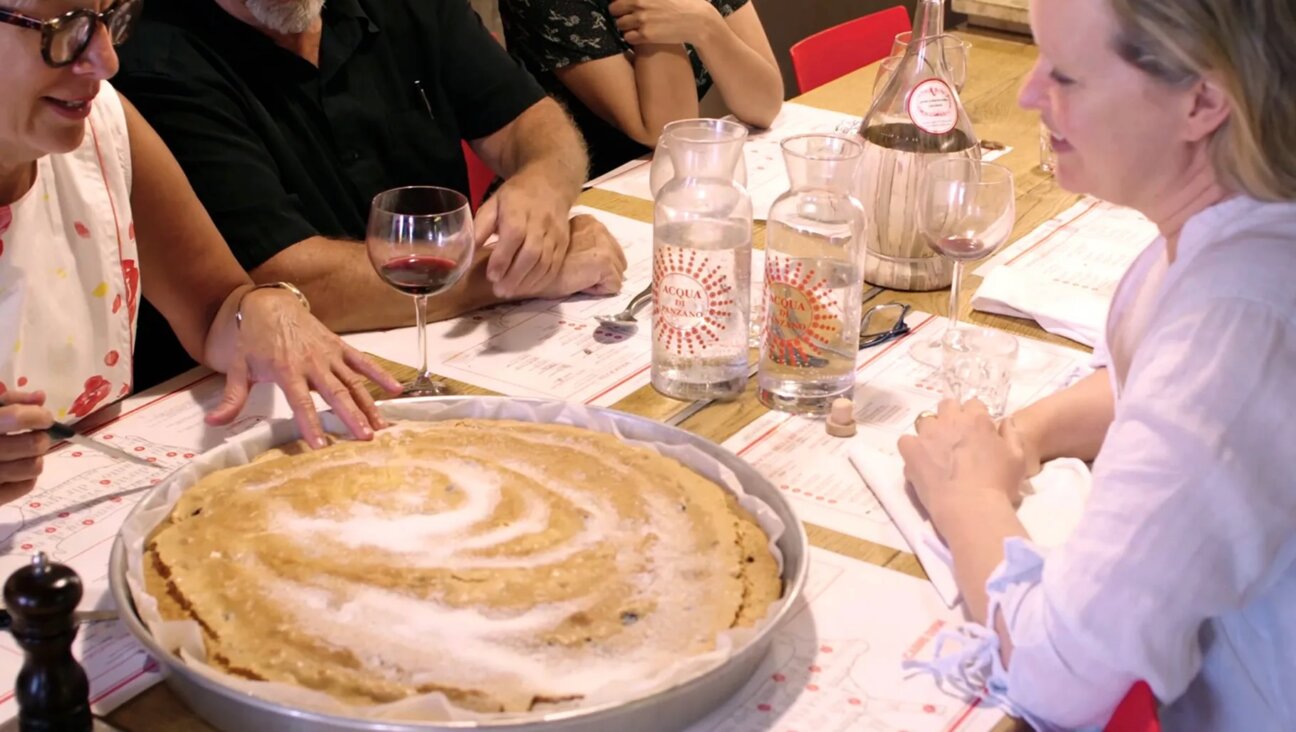Craving the Flavors of the Persian Gulf

Feastly Fixings: Persian meals are often accompanied by plates of herbs, nuts and vegetables. Image by Sara Remington
If love, like food, has the ability to nourish, then the absence of love can leave us with deep and unquenchable feelings of hunger. An emptiness that is complete and all-consuming, as if we have not eaten in years.
Two books coming out this month, the novel “Tomorrow There Will Be Apricots,” by Jessica Soffer, and the cookbook “The New Persian Kitchen,” by Louisa Shafia, tell stories of love, craving and family lost and gained, all through the experience of food — particularly the tangy, smoky, cardamom and saffron-spiced dishes of the Persian Gulf.
The Jewish communities of Iran and Iraq now live almost exclusively outside of their countries of origin. There are currently around 9,000 Jews living in Iran — more than many Westerners might assume, but a tiny fraction of the former population. Iraq’s situation is even more dramatic: According to a 2008 New York Times article, there are fewer than 10 Jews currently living there.
Diaspora communities, like Iranian Jews in Los Angeles or Iraqi Jews in Israel, must preserve their cultures, recipes and food traditions in foreign lands — a feat that grows increasingly difficult with the passing generations. Soffer and Shafia’s books, then, are akin to canning peaches for winter. They take the fresh memories and experiences of their relatives’ (particularly their fathers’) lives and kitchens, and produce something lasting and sweet.
In “Tomorrow There Will Be Apricots,” Soffer weaves together two narratives — one of a wise but scarred 14-year-old named Lorca, and another of an aging Iraqi Jewish woman, Victoria, who fled Baghdad decades ago and lives in present-day New York City. Both women burn for different reasons: Lorca pines for the fickle affection of her narcissistic mother, a high-powered chef, and Victoria longs for the exclusive love of her husband Joseph. (Readers learn early in the book that decades before, Victoria convinced Joseph to give up their daughter for adoption out of fear that “he would love a little baby more than he loved me.”)
An Iraqi cooking class taught by Victoria brings the two women together. One young, one old, they cook together in Victoria’s apartment, mixing dough for shakrlama, a pistachio and almond cookie flavored with rose water, and chopping vegetables for a lamb and okra stew called bamia. Through their shared work and gentle explorations of one another’s lives, the pain each woman experiences begins to soften.
Soffer’s father, like Victoria and Joseph, escaped the mounting anti-Semitism of his Baghdad home in the late 1940s. In New York, he became the well-known painter and sculptor Sasson Soffer. Despite their age difference (the elder Soffer was 60 when his daughter was born), Jessica Soffer had a close relationship with him before he passed away three years ago. Partly as a result, Soffer said she “gravitates towards stories where an older person and younger person can heal each other.”
“Tomorrow There Will be Apricots” regrettably contains only one recipe — for masgouf, a spiced grilled carp that plays a central role in the story and is considered the national dish of Iraq. “It’s a very nostalgic recipe for Iraqi Jews,” Soffer said. “Everything my dad’s family remembers from growing up in Baghdad is completely gone.”
And yet the book is threaded through with rich food imagery, like the intricate meals Lorca cooks for her unappreciative mother, or the platter of pignoli cookies and bowl of crushed almonds with honey and sugar awaiting Victoria and Joseph when they arrive home, without their child, after Victoria gives birth. “He wanted a cookie. Hell, he wanted the whole plate,” Soffer writes of Joseph’s longing.
“I wrote this book, in part, to honor my father’s culture,” Soffer said. Sasson Soffer, who grew sick early in his daughter’s writing process, was unable to be a resource for her. But he undoubtedly would have appreciated the book, whose writing is as painful as it is exquisite, and which exposes the raw power of love.
Louisa Shafia’s cookbook, “The New Persian Kitchen,” shifts eastward from Iraq, exploring the cuisine of Iran from a contemporary American perspective. In the past five years, an increasing number of Persian-themed cookbooks have been published. It seems that Iranian food, which chef and cookbook author Yotam Ottolenghi writes “has yet to be properly discovered in the West,” might be on the brink of reaching wider cultural awareness.
What sets “The New Persian Kitchen” apart is how seamlessly Shafia weaves her vibrantly flavored recipes — like barley stew with lamb and rhubarb, amaranth rice pudding with rose water, or whole roasted fish with oranges and saffron — with elegant essays about the overlapping religions and sprawling Silk Road cultures that shaped Iran’s cuisine.
Shafia’s multicultural approach is rooted in her own history. Her mother is American with Eastern European Jewish ancestry, and her father is an Iranian Muslim who immigrated to the United States in 1961. “My mom wanted my sister and me to be raised Jewish, but my dad absolutely did not,” she said. This familial dissonance made it challenging for Shafia to connect with her parents, or fully embrace either side of her identity. Except through food.
Growing up in the 1970s, Shafia writes that their family meals were punctuated by “an otherworldly Persian element in the form of red eggplant stew spiced with pomegranate molasses, fluffy saffron rice, and succulent lamb kebabs pulled from metal skewers.”
In her late 20s, while working as a professional cook in San Francisco, Shafia began to embrace the creative and personal potential of exploring her father’s culinary heritage. Already an advocate of healthy, produce-centered cooking (her first book is called “Lucid Food: Cooking for an Eco-Conscious Life”), Persian cuisine’s emphasis on fresh herbs, tangy yogurt, beans, fish and fragrant spices was a compelling fit. The connection would also uncover for her a rich and unexpected family life.
Traveling to Iran for culinary research proved unfeasible, so Shafia went instead to Los Angeles, where much of her father’s extended family lives. “I have this huge tribe of Iranian cousins out there that I did not really understand,” she said. Once she arrived, these aunts, uncles and cousins opened their kitchens, sharing dishes like baghali polo (rice with fava beans and dill), stories and elaborate family feasts. Unlike Shafia, who today identifies as culturally Jewish, her father’s family is Muslim. But they welcomed her all the same. “The essence of this book comes from my extended family, who taught me as much about generosity as they did about food,” Shafia writes in the book’s acknowledgements.
Soffer and Shafia’s approaches to sharing the food and stories of Iraq and Iran differ significantly. But, collectively, their books explore, through prose or recipes, the feeding we do when we cook for and eat with those we love. And more importantly, they illuminate the feeding we can do simply by being there.
Leah Koenig writes a monthly column on food. Contact her at [email protected].

Image by Sara Remington
Whole Roasted Fish with Oranges and Saffron
Reprinted with permission from ‘The New Persian Kitchen’ by Louisa Shafia.
In the marinade for this dish, the mix of different citrus juices mimics the flavor of sour oranges, a favorite ingredient in Persian cooking. Use a mandolin to cut the thin orange slices that cover the fish.
Serves 4
1 tablespoon grated Meyer lemon zest
¼ cup plus 2 tablespoons each of freshly squeezed Meyer lemon, orange and lime juice
1 two-pound red snapper, cod, haddock, or sea bass, cleaned and butterflied
Sea salt and freshly ground black pepper
3 tablespoons grapeseed oil
3 cloves garlic, minced
3 small oranges, sliced 1⁄8-inch thick
½ teaspoon saffron, ground and steeped in 1 tablespoon hot water
2 tablespoons extra-virgin olive oil.
1) Preheat the oven to 400 degrees and grease a baking sheet.
2) In a bowl, whisk the lemon zest and juice with the orange juice and lime juice.
3) Rub the fish inside and out with salt and pepper and 2 tablespoons of the grapeseed oil. Spread the garlic on the inside of the fish.
4) Open the fish and lay a few orange slices inside, then press closed.
5) With a sharp knife, make several slits in the top of the fish, without completely slicing through.
6) Drizzle a few tablespoons of the citrus juice over the fish, and cover it from head to tail with the remaining orange slices. Spoon the remaining 1 tablespoon of grapeseed oil on top and season with salt.
7) Bake until the fish flakes easily with a fork, about 35 minutes.
8) Heat the remaining citrus juice in a small skillet over medium-high heat until bubbling and reduced by half.
9) Turn off the heat and whisk in the saffron and olive oil. Serve fish warm, topped with the citrus sauce.
A message from our Publisher & CEO Rachel Fishman Feddersen

I hope you appreciated this article. Before you go, I’d like to ask you to please support the Forward’s award-winning, nonprofit journalism during this critical time.
We’ve set a goal to raise $260,000 by December 31. That’s an ambitious goal, but one that will give us the resources we need to invest in the high quality news, opinion, analysis and cultural coverage that isn’t available anywhere else.
If you feel inspired to make an impact, now is the time to give something back. Join us as a member at your most generous level.
— Rachel Fishman Feddersen, Publisher and CEO
























